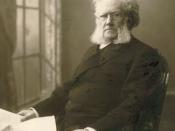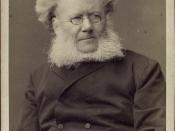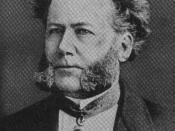The themes in the Albert Camus's, "The Plague", and "Hedda Gabler" by Henrik Ibsen are rather interesting. The central theme in "The Plague" is suffering itself, which crushes the people of Oran physically and spiritually. The plague, is described as force of evil, is the main cause of the suffering. The main theme for "Hedda Gabler" can be described as a conflict between society and the individual. She wants freedom, but she feels that she cannot leave her marriage. To occupy her time, she manipulates the lives of everyone around her. Through the use of theme, Ibsen produced work that uniquely portrays the sources of the motivations of the manipulative woman.
There is a lot of foreshadowing in the beginning of the plague. Camus explains Oran's future reaction to the devastating plague. Dr. Rieux seizes the reader's interest and depicts a city soon to be affected by death.
Dr. Rieux, by delineating the town, its people, their habits and beliefs, and his personal methods, sets the stage for his narrative, and gives the reader a small view of the horrible fate soon to come.
Dr. Rieux also he talks about the difficulty of giving up habits and routines. The citizens all have habits that are repeated daily. They all work hard, but not for ethical or moral reasons. Their unawareness of life's riches and pleasures demonstrate their susceptibility to the plague. They disconcert themselves with matters not involving money. Not knowing what life entails more than work and habits, sets the theme of the book.
Another theme is the value of human life. Dr. Rieux acknowledges that man cannot overcome death. Dr. Rieux continues by describing the difficulty the people experiencing death in Oran. As the plague claims thousands of lives, the citizens...


